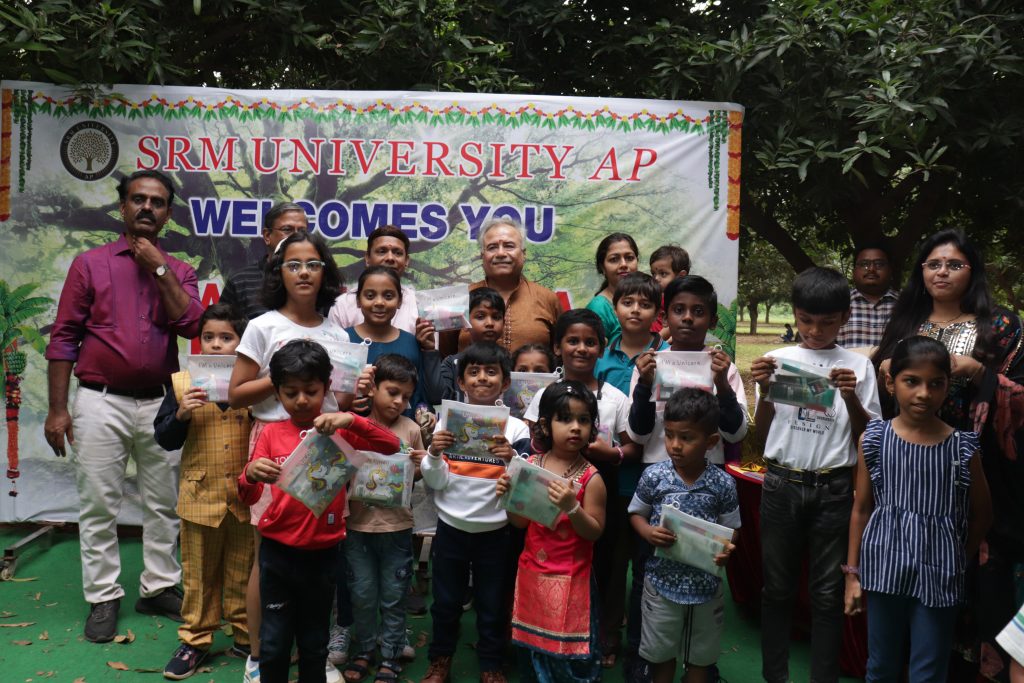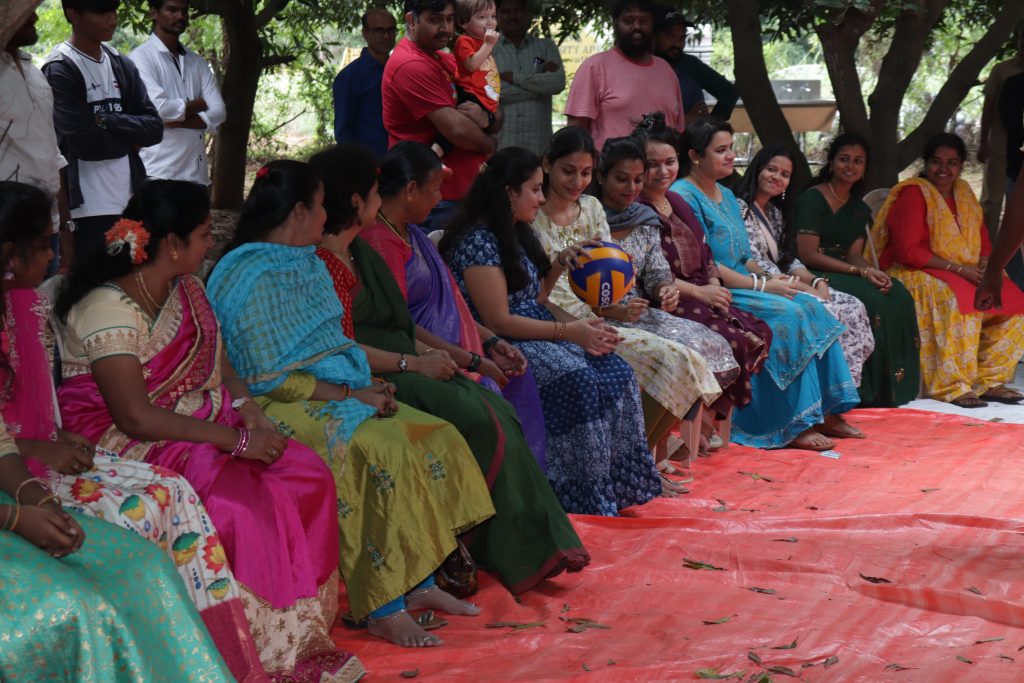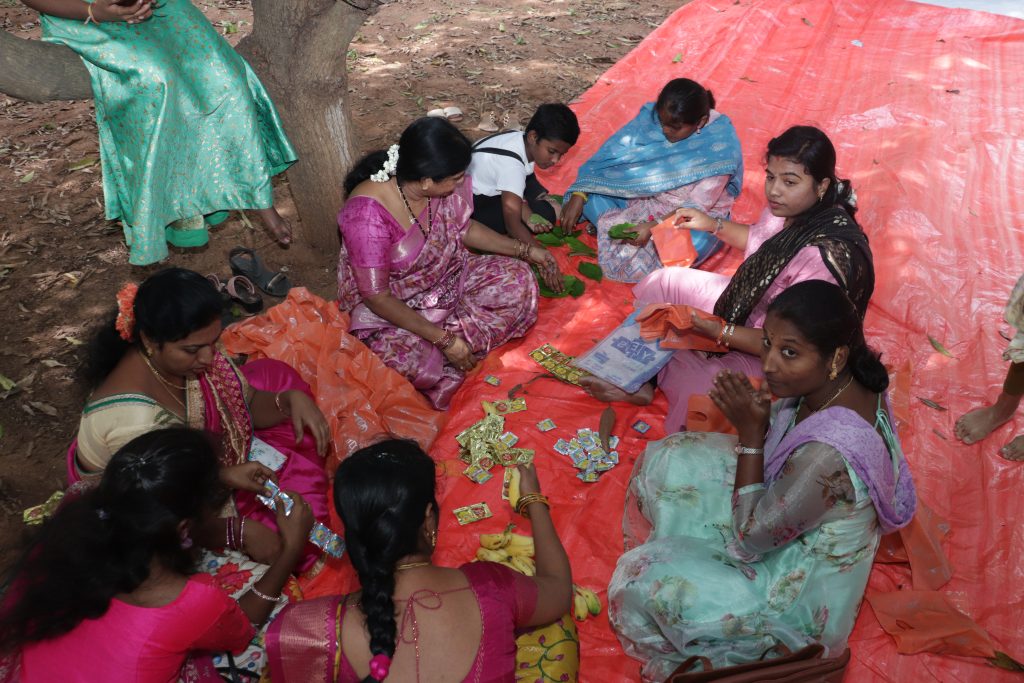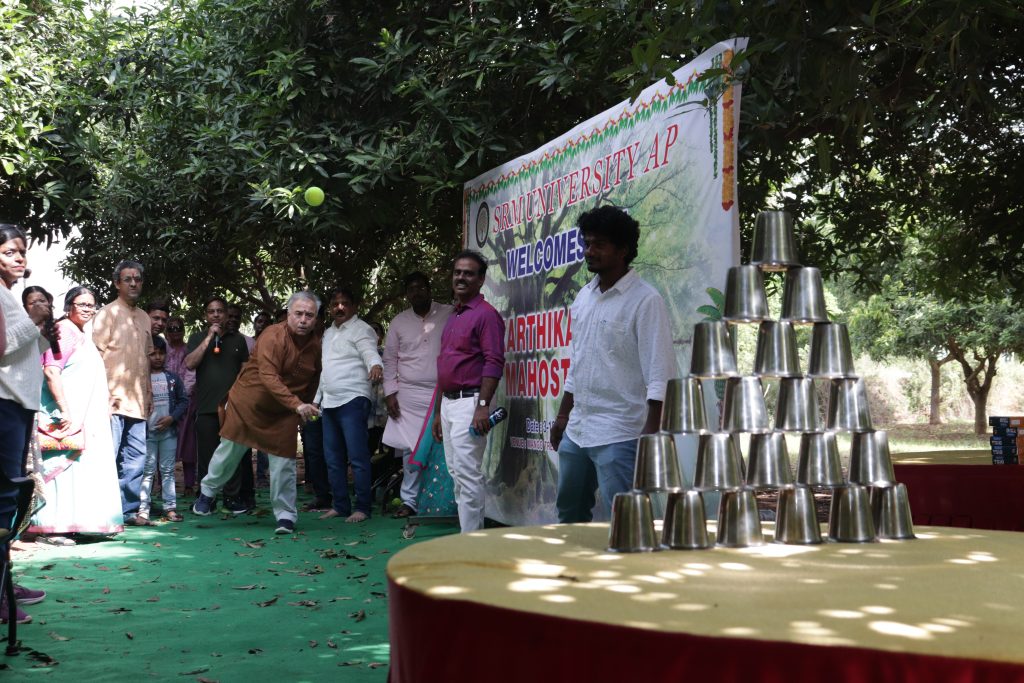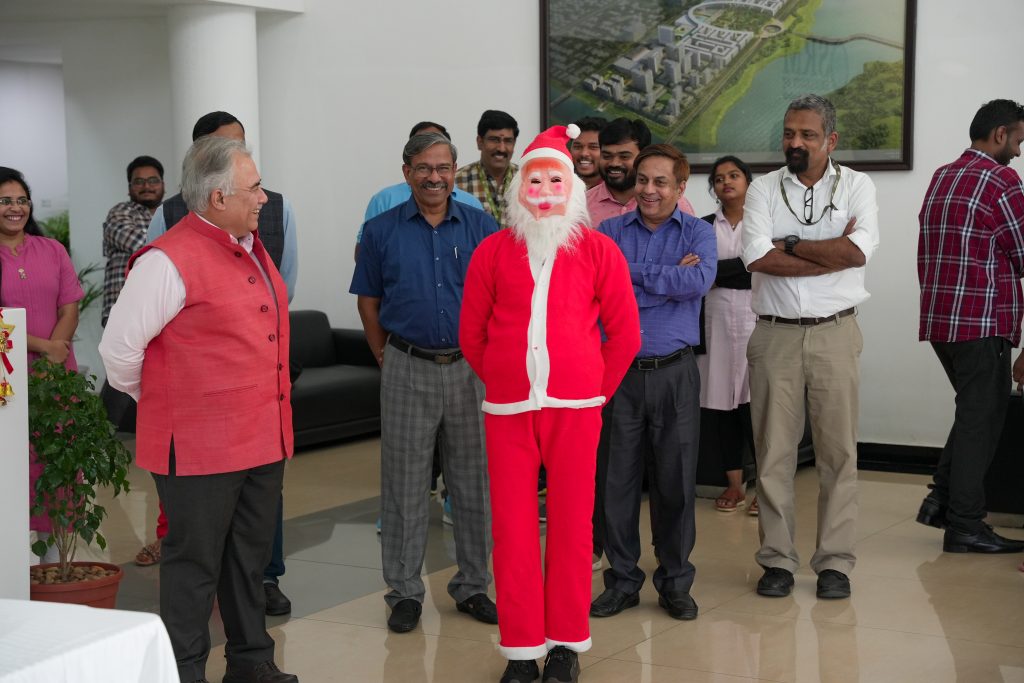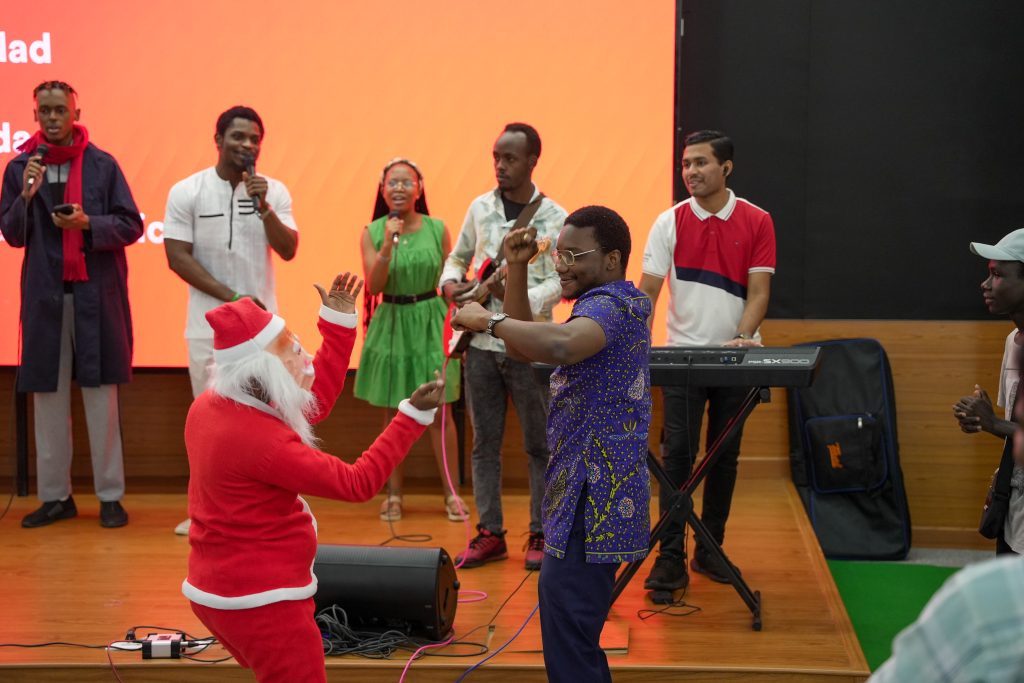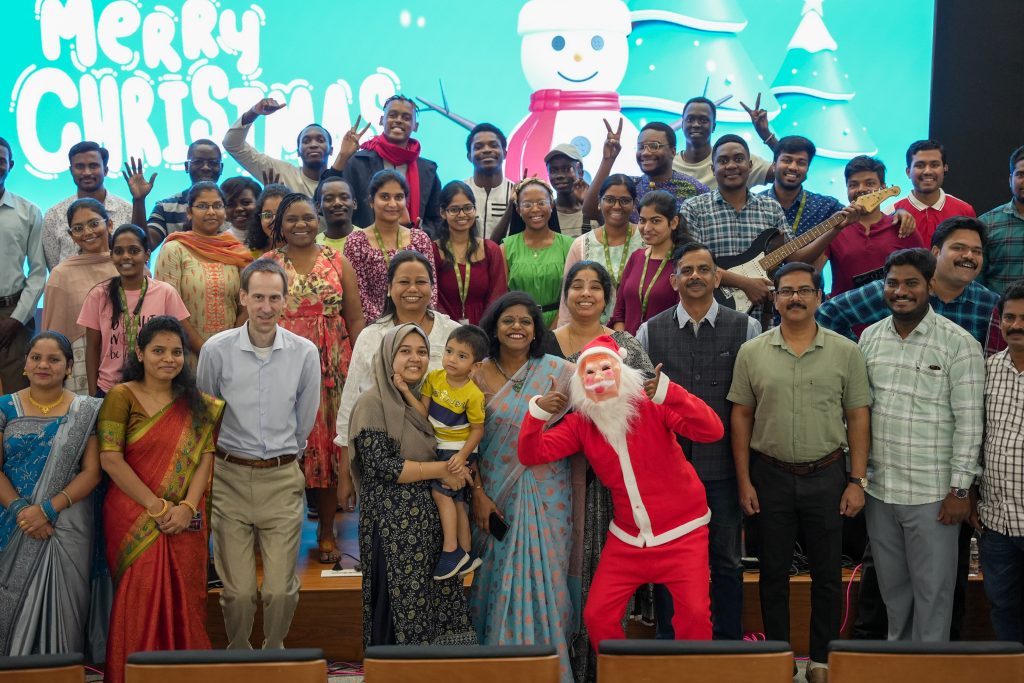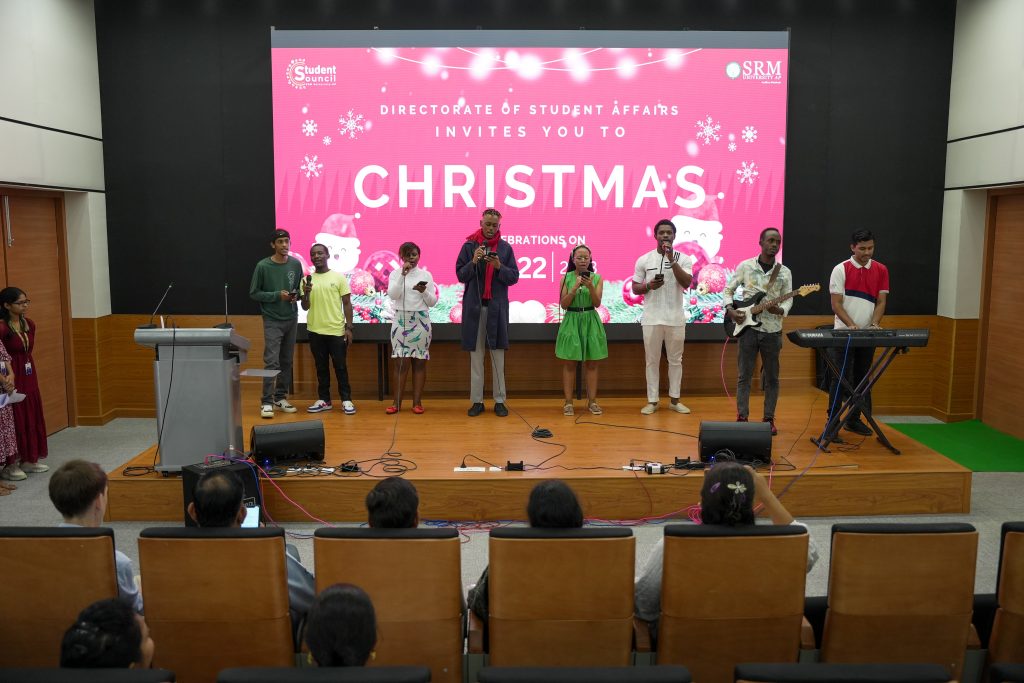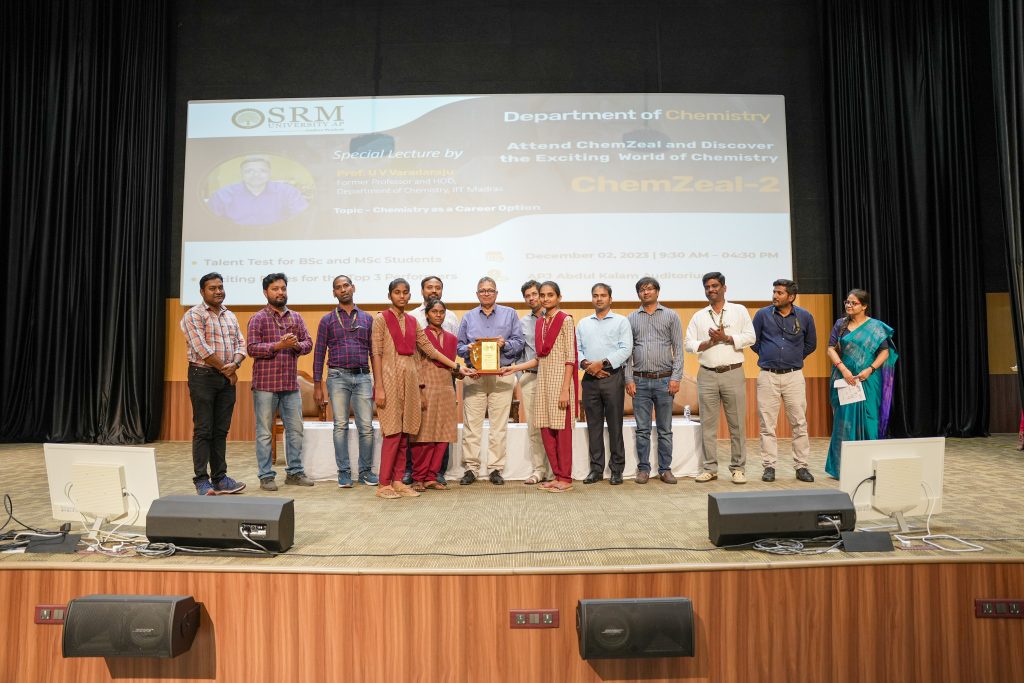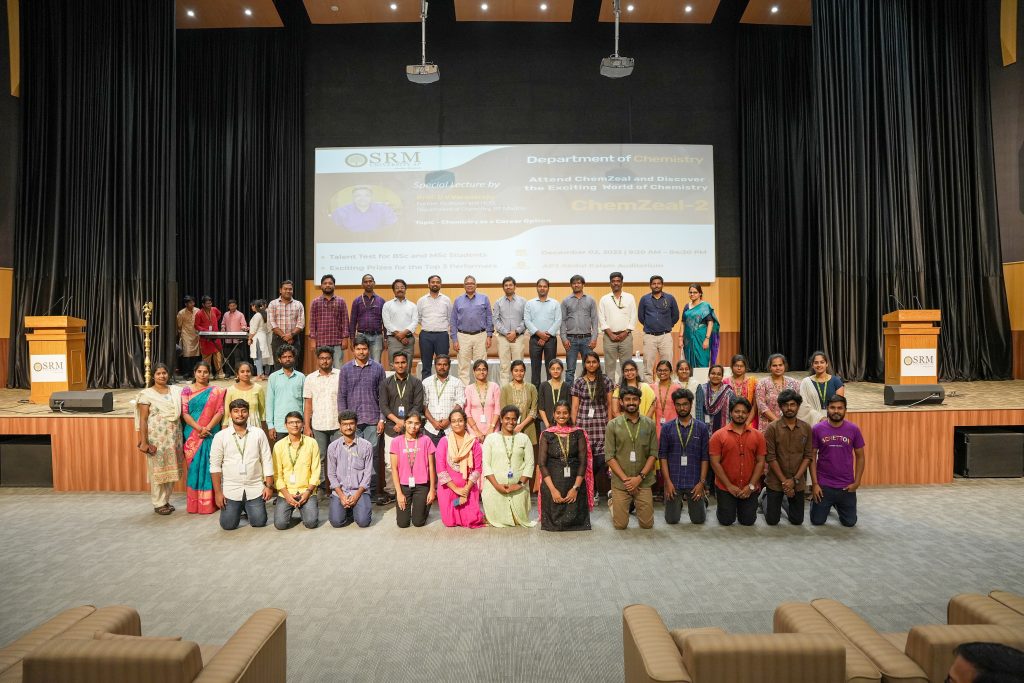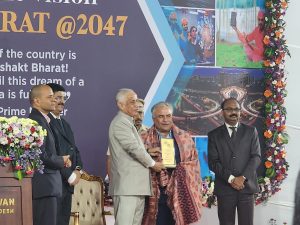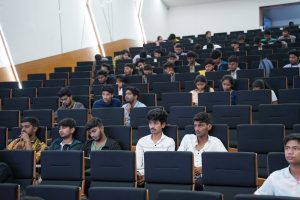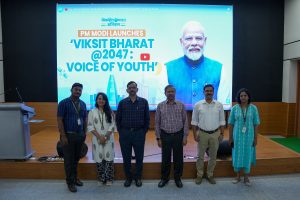Redefining Global Education Standards
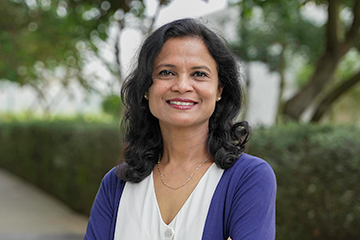
In the dynamic landscape of global education and employment, SRM University-AP reaffirms its commitment to producing not just graduates but global citizens through the instrumental role played by Directorate of International Relations & Higher Studies (IR & HS).
At SRM University-AP, IR & HS stands as a catalyst in producing graduates who transcend geographical boundaries. It goes beyond the conventional approach to education, shaping global citizens equipped to navigate the complexities of an interconnected world. The focus is not solely on degrees but on fostering a global mindset that prepares students for the challenges of a diverse and dynamic workforce. Currently, the university proudly hosts over 150 international students from more than 24 countries who have joined us for BSc, BTech and Management programmes enriching the academic landscape with diverse perspectives.
Global Immersion Programmes, Semester Abroad Programmes, and International Internships offer students immersive experiences, exposing them to diverse cultures and educational practices. These initiatives extend beyond the classroom, providing a holistic education that goes beyond borders. The university has established research collaborations with prestigious institutions such as Maine University, USA, fostering a culture of academic excellence and innovation.
Events such as the Diplomatic Exchange and Global Principal Conclave showcase the commitment of SRM University-AP to fosters global partnerships and collaborations. These forums create opportunities for dialogue, knowledge exchange, and collaborative ventures, enriching the academic experience for students by encouraging the spirit of curiosity, multidisciplinary alliance, inbound and outbound exchanges, research and outreach programs that transcend borders.
In a significant development, the recent appointment of Ms. Aditi Jain as Director of International Relations & Higher Studies (IR & HS) brings a fresh perspective and renewed vigor. With a wealth of over 18 years of experience spanning education, skill development, and the EdTech industry. She has contributed to Fortune 500 companies, the development sector, universities, and global start-ups, including renowned organizations like American Express, Samsung, Microsoft, and Bennett University. Ms. Jain is poised to lead the Directorate to new heights, contributing to SRM University-AP‘s standing as a global education hub.
Harvard Alumnus Joins SRM AP as Director – Entrepreneurship
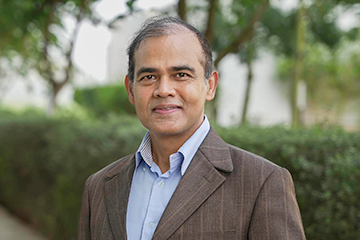
SRM University-AP has recently appointed Mr Sidharth Shankar Tripathy as its new Director of Entrepreneurship & Innovation and Professor of Practice in Entrepreneurship. This appointment is a significant milestone in the varsity’s effort to enhance the entrepreneurial fervour on campus, especially since it’s declaration of the year 2023 as The Year of Entrepreneurship.
Mr Sidharth Shankar Tripathy, an alumnus of Harvard University with a Post Graduate Diploma in Management from S P Jain Institute of Management & Research is a seasoned educator and entrepreneur, who has launched and led several global ventures successfully. As an accomplished entrepreneur, Mr Sidharth Tripathy has founded numerous successful ventures. Some of his notable achievements include establishing Brandgain, Asia’s first Sales & Marketing Process Outsourcing company, and Newzworm, the world’s first global news source for pre-adolescent and adolescent children. His enterprise, Skillizen Learning, provides life skills training across 72 countries. Additionally, he is also the co-founder of “iSEED-The Indian School of Entrepreneurship” and “Life Skills University, Singapore”.
Dr P Sathyanarayanan, Pro-Chancellor of the varsity, welcomed Mr Shankar Tripathy, stating that, “he is an invaluable asset to the university.” He said, “Under his expert guidance, the university will transform its entrepreneurial landscape to achieve institutional excellence.” Vice Chancellor, Prof. Manoj K Arora, also welcomed Mr Tripathy aboard. Prof. Arora expressed his appreciation of Mr Shankar Tripathy’s expertise and leadership that will guide the budding entrepreneurs of the varsity to scale new heights on global frontiers.
In response, Mr Shankar Tripathy expressed his excitement in joining SRM University-AP and stated that “the adrenalin rush of joining the varsity is quite akin to starting his first entrepreneurial venture 20 years back”. He also mentioned that he is thrilled to start this journey to make SRM University-AP, India’s Stanford.
The Entrepreneurship & Innovation Directorate at SRM University-AP is a burgeoning department with over 30 startups under incubation, women-led startups, national and international collaborators like Berkeley University of California, Stanford SEED, MHRD, Start-up India, MSME, and APSSDC to name a few. The varsity believes that the Directorate of Entrepreneurship and Innovation will further flourish with Mr Sidharth Shankar Tripathy at its helm.
- Published in News
Karthik Vana Mahotsava: A Green Celebration of Nature’s Bounty
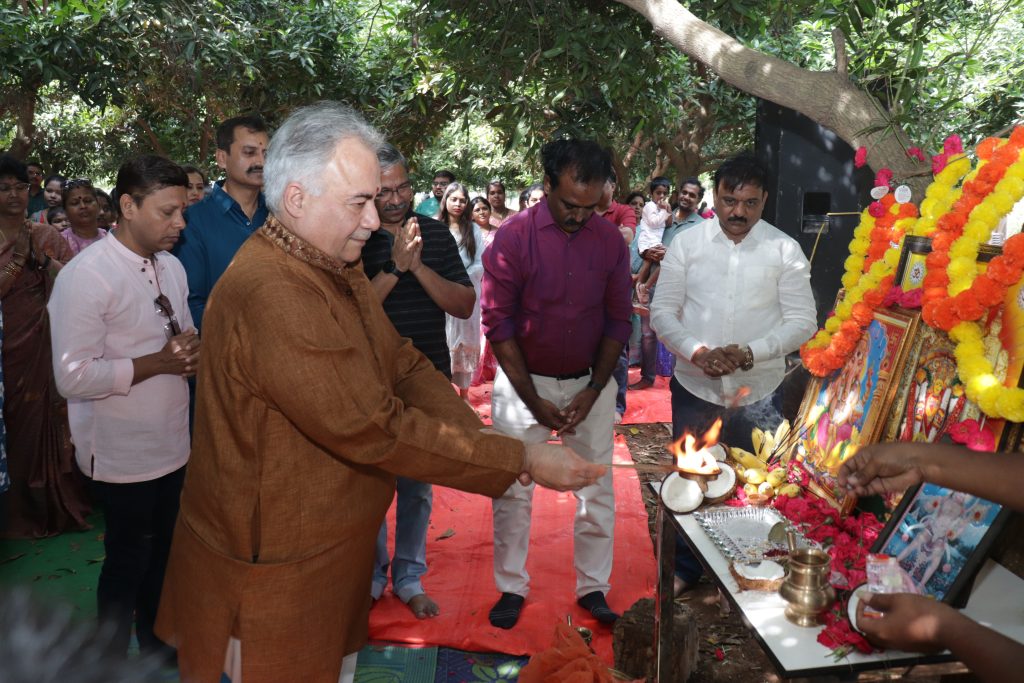
In the Karthik month of the Hindu calendar, a vibrant and eco-friendly celebration, Karthika Vana Mahotsavam took centre stage at SRM University-AP. The varsity honoured the tradition and fostered environmental consciousness with its Vanamahotsavam. This annual event has become a significant tradition in the varsity and draws faculty and staff and their family members from different communities together to celebrate the beauty of the earth and promote sustainable living.
The celebration that took place in the Mango Gardens, near Sri City in Nidamaru saw the participation of members of the leadership including Vice Chancellor, Prof. Manoj K Arora; Registrar, Dr R Premkumar, Directors and former members of the leadership. The Vana Mahotsava intended to honour both nature and celebrate the bond between humans and nature was organised by the Directorate of Human Resource Management.
The event also saw children and families bonding over games and other exciting activities organised by the Directorate. Vanamahotsavam was a holistic way of fostering a sense of responsibility for future generations and served as a reminder that small, concerted efforts can contribute significantly to the global movement for a greener and more sustainable planet
- Published in News, University Event
Celebrating Christmas on Campus: A Joyous University Tradition
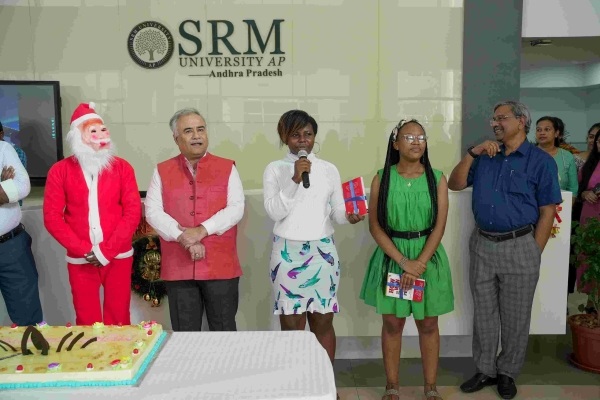
The spirit of Christmas echoed through the halls of our campus this year as students, faculty, and staff came together to celebrate the festive season. The Christmas celebration organised by the Directorate of Student Affairs was a grand affair, with enthusiastic participation from key figures, including the Vice-Chancellor, Registrar, Deans of all schools, and dedicated faculty and staff.
The event saw an inclusive participation of international students, adding a global touch to the festivities. The diverse cultural backgrounds of the international students enriched the celebration, reflecting the unity in diversity that defines the academic community at SRM University-AP.
One of the highlights of the Christmas celebration was the active involvement of the university leadership. The Vice-Chancellor, with a radiant smile, inaugurated the event, setting a joyous tone for the entire gathering. The heart of the celebration was the involvement of both local and international students. The student affairs directorate organised a series of entertaining games and activities that brought everyone together. International students, showcasing their unique talents, not only participated actively but also emerged victorious in several competitions, winning well-deserved prizes.
- Published in News, Students Affairs Events
A Research On Examining Stress Among Adolescents
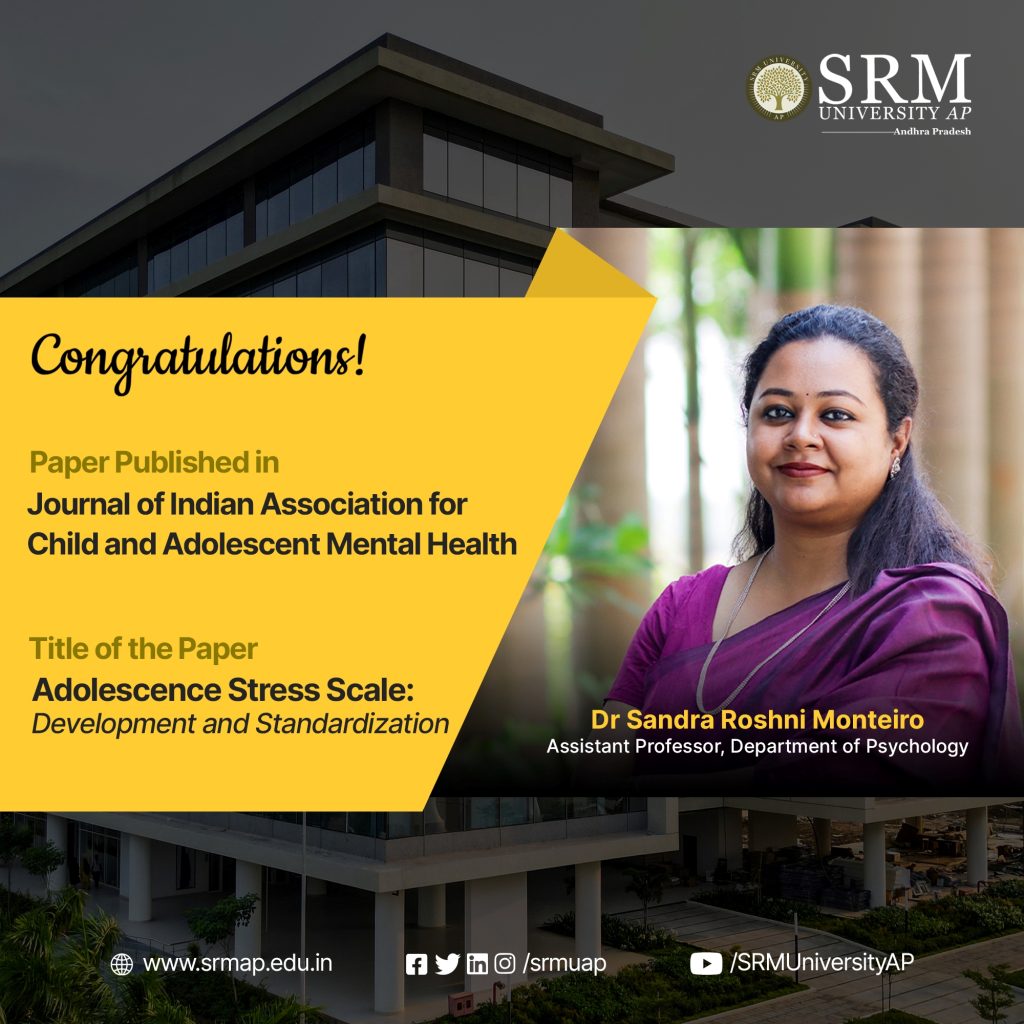
The research paper titled “The Adolescence Stress Scale: Development and Standardization” is a significant contribution to the field of psychology. The paper by Dr Sandra Roshni Monteiro, Assistant Professor at the Department of Psychology in SRM University-AP featured in The Journal of Indian Association for Child and Adolescent Mental Health and provides a detailed account of the development and standardisation of the scale, highlighting its importance and relevance. Dr Monteiro has developed a comprehensive stress scale that aims to evaluate the psychometric issues faced by school-going adolescents.
Here’s a brief extract of the paper.
Abstract
Background/Aim
The objective of the paper was to develop a comprehensive “Adolescence Stress Scale” and to examine different psychometric issues in the development, initial validation, and standardization of this scale.
Method
Exploratory factor analysis was conducted on the data procured from a sample of 634 (11–18 years) school-going adolescents in India.
Results
An exploratory analysis provided a 10-factor structure, namely, major loss-induced stress, enforcement or conflict-induced stress, phobic stress, interpersonal conflict-induced stress, punishment-induced stress, illness and injury-induced stress, performance stress, imposition-induced stress, insecurity-induced stress, and unhealthy environment-induced stress. The 10 oblique factor solutions are found to be interrelated and interdependent with good indices of internal consistency, and content validity.
Conclusions
This scale development is a novel and powerful measure that taps onto various aspects of stress experienced by school-going adolescents. The scale can facilitate researchers, clinicians, and teachers to identify and quantify the significant sources of stress in adolescents in school, or clinic settings.
- Published in Departmental News, News, Psychology News, Research News
ChemZeal 2: An Outreach Initiative by the Dept. of Chemistry
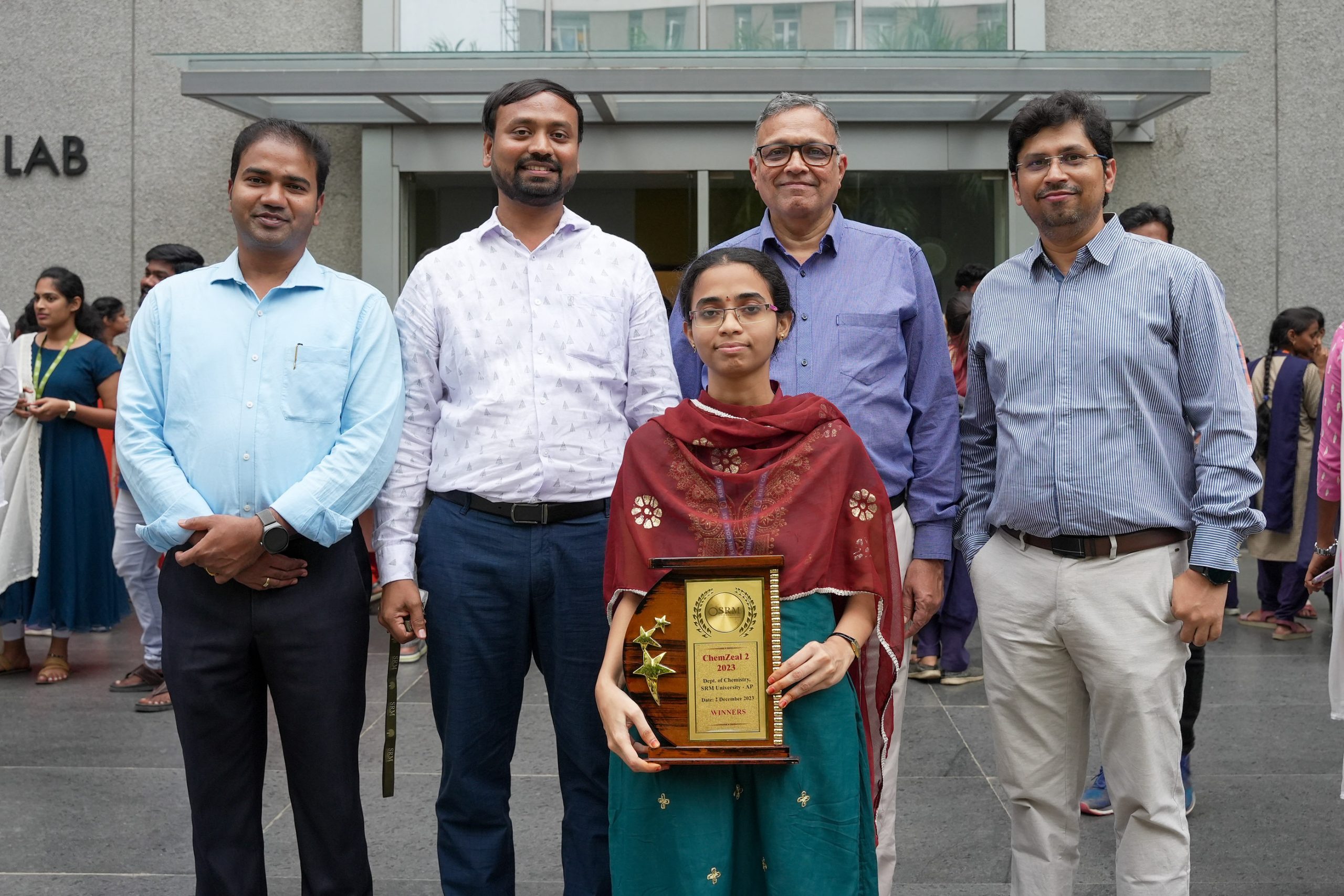
The Department of Chemistry at SRM University-AP organised an academic colloquium called ChemZeal 2 on December 02, 2023. The event aimed to promote the Department and its research among undergraduate and graduate students from various colleges. It also provided a platform for students to interact with chemistry enthusiasts and learn about the latest advancements and research in the field.
ChemZeal 2 featured a lecture by academic stalwart, Prof. U V Varadaraju on Solid-State Materials in Chemistry from the Department of Chemistry, IIT Madras. Prof. Varadaraju also spoke about various aspects of the field, including research, career paths, higher studies, and job opportunities in the industry.
The welcome note was given by the Department Head, Dr Pardha Saradhi Maram, while Vice-Chancellor Prof. Manoj K Arora and Prof. Jayaseelan Murugaiyan, Associate Dean in-charge (Science), also addressed the gathering with their valuable inputs. The event also included an interactive session with the guest speaker, where faculty and students could interact and get expert insights.
ChemZeal 2 also featured a talent test for over 320+ students from different colleges, with prizes awarded to the top three winners. The event was designed to attract students to pursue higher education and research in the field of Chemistry and provided a platform for BSc/MSc/PhD students to showcase their research and interact with potential candidates.
The event organisers – Dr Sabyasachi Chakrabortty (Convenor) & Dr J P Raja Pandiyan (Co-convenor) helped culminate the outreach activity with a campus tour, where attendees could witness state-of-the-art facilities, high-end research labs, and futuristic technology.
- Published in Chemistry-news, Departmental News, News
Viksit Bharat@2047: Empowering India’s Youth
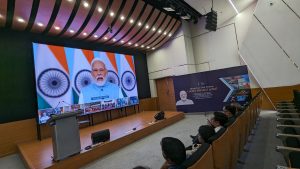 In a remarkable display of technological prowess and inclusivity, SRM University-AP organised a live-streaming event for the launch of ‘Viksit Bharat @2047: Voice of Youth’ by Prime Minister Shri Narendra Modi. The momentous occasion took place at the university’s auditorium, witnessing the presence of esteemed dignitaries, including the Registrar, Dr R Premkumar, Director of Student Affairs, Mr Anil Kumar Nigam, Director of Communications, Mr Pankaj Belwariar, Associate Director of Student Affairs, Ms Revathi Balakrishnan, and a multitude of enthusiastic students.The event, which aimed to empower the youth and encourage their active participation in shaping the future of India, was broadcasted live to ensure widespread accessibility. The atmosphere in the auditorium was electric as the audience eagerly awaited the Prime Minister’s address.
In a remarkable display of technological prowess and inclusivity, SRM University-AP organised a live-streaming event for the launch of ‘Viksit Bharat @2047: Voice of Youth’ by Prime Minister Shri Narendra Modi. The momentous occasion took place at the university’s auditorium, witnessing the presence of esteemed dignitaries, including the Registrar, Dr R Premkumar, Director of Student Affairs, Mr Anil Kumar Nigam, Director of Communications, Mr Pankaj Belwariar, Associate Director of Student Affairs, Ms Revathi Balakrishnan, and a multitude of enthusiastic students.The event, which aimed to empower the youth and encourage their active participation in shaping the future of India, was broadcasted live to ensure widespread accessibility. The atmosphere in the auditorium was electric as the audience eagerly awaited the Prime Minister’s address.
Parallel to the main event, a program was held at Raj Bhavan in Vijayawada, where Vice Chancellor, Prof. Manoj K Arora along with other prominent personalities, graced the occasion. Prof. Manoj K Arora actively participated in a panel discussion centered around the theme of ‘Viksit Bharat @2047: Voice of Youth,’ sharing valuable insights and ideas for the nation’s progress. The Vice Chancellor’s dynamic contribution to the panel discussion was recognised and appreciated by the Governor of Andhra Pradesh, who honoured him with a shawl and a memento as a token of gratitude.
The live streaming event organised by SRMAP not only showcased their commitment to embracing technology for the benefit of the students and the wider community but also provided a platform for young minds to engage with the Prime Minister’s vision for a developed and empowered India. The launch of ‘Viksit Bharat@2047: Voice of Youth’ marks a significant milestone in the journey towards a progressive and inclusive nation, with SRM University-AP playing a pivotal role in fostering the spirit of youth leadership and participation.
- Published in News
SLP-E: Enhancing Privacy and Lifespan in WSNs for IoT
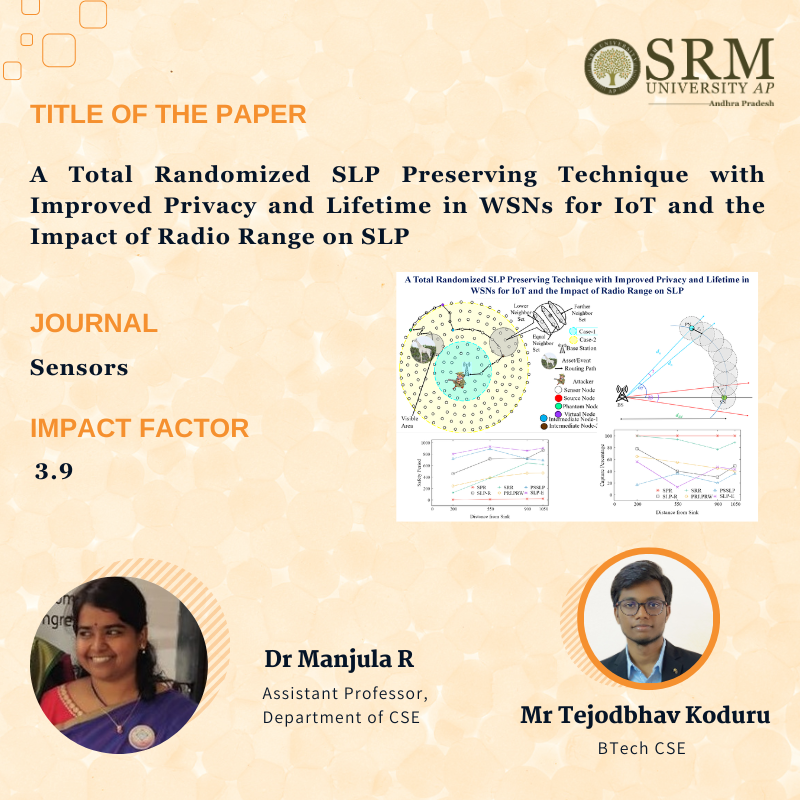
The Department of Computer Science and Engineering is thrilled to share that the paper titled, “A Total Randomized SLP Preserving Technique with Improved Privacy and Lifetime in WSNs for IoT and the Impact of Radio Range on SLP” has been published by Dr Manjula R, Assistant Professor, Department of CSE, and BTech-CSE Student Mr Tejodbhav Koduru in “Sensors“, a Q2 journal, having an Impact Factor of 3.9. Their research addresses the critical need for improved source location privacy and extended network longevity, presenting a pioneering solution known as Source Location Privacy with Enhanced Privacy and Network Lifetime (SLP-E).
Abstract
SLP-E utilises a unique combination of techniques, including a reverse random walk, a walk on annular rings, and min-hop routing, to diversify routing pathways within the network. Unlike existing SLP techniques that either prioritize privacy over network lifetime or vice versa, this approach aims to simultaneously enhance safety period, network lifetime, and privacy uniformly. Notably, this research also explores the impact of sensor radio range on Network Lifetime metrics and privacy strength within the context of SLP in WSN.
Practical Implementation/Social Implications of the research
This research holds real-world significance, especially in scenarios like protecting a lone white giraffe in Kenya fitted with a GPS tracker. Poachers pose a serious threat to such animals, hacking GPS devices to locate and harm them. This solution offers a viable approach to mitigate these threats, providing practical implications for the conservation of endangered species.
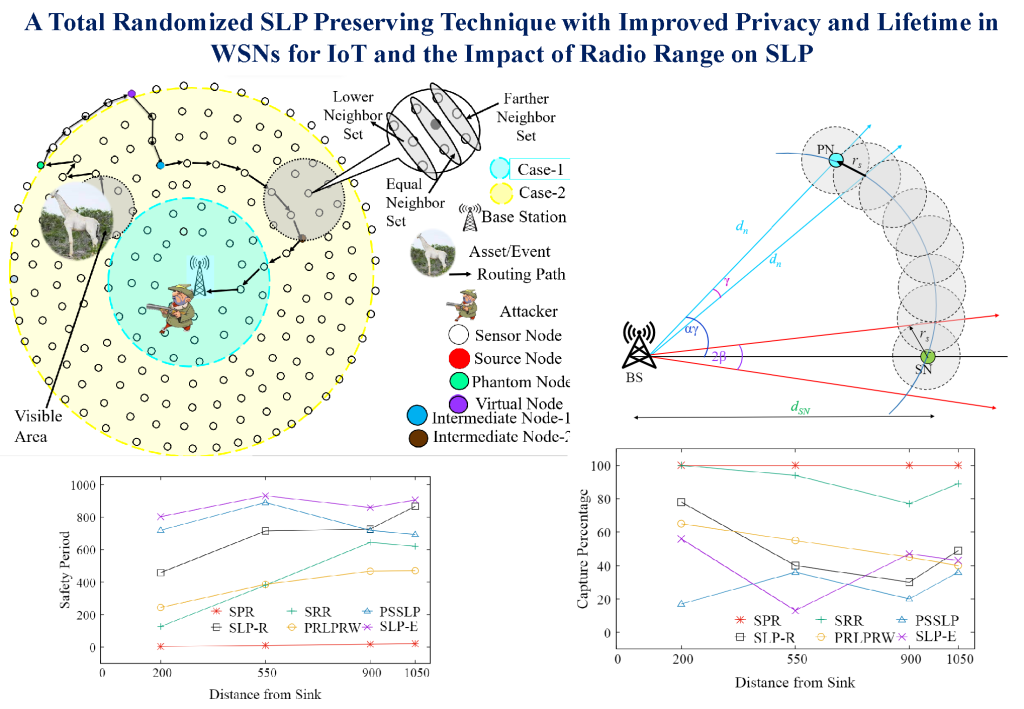
Collaborations
- Mr Tejodbhav Koduru from SRM University-AP
- Prof. Raja Datta from IIT Kharagpur
- Ms Florence Mukamanzi, Dr Damien Hanyurwimfura and Prof. Mukanyiligira Didacienne from the African Center of Excellence in the Internet of Things, University of Rwanda
- Published in CSE NEWS, Departmental News, News, Research News
Paper Presented at the NIAS Conference in Amsterdam
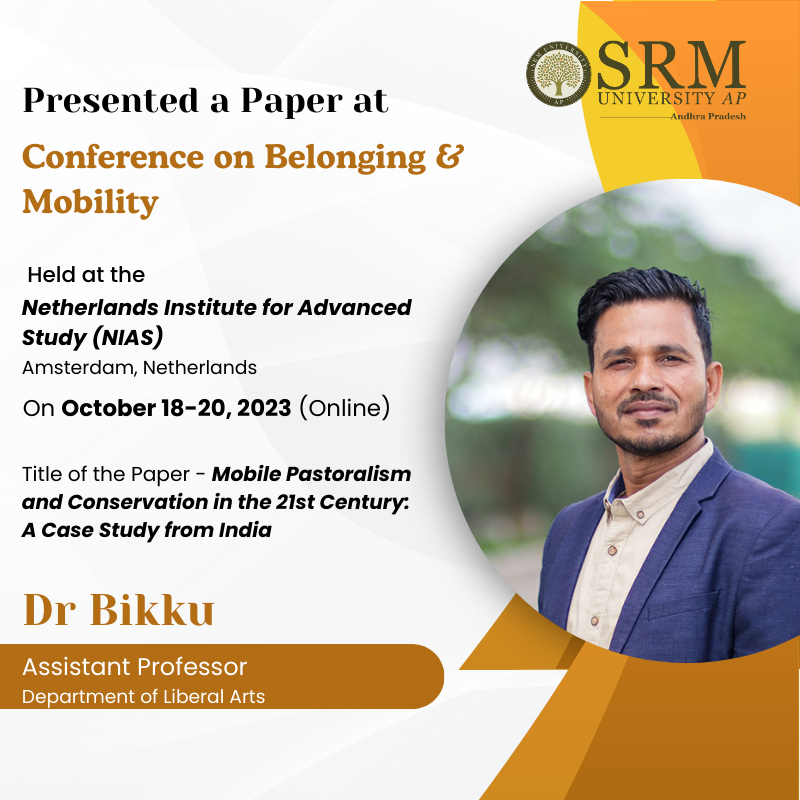
Dr Bikku, Assistant Professor, Department of Liberal Arts has presented a paper titled “Mobile Pastoralism and Conservation in the 21st Century: A Case Study from India” at the NIAS Conference on Belonging & Mobility, held at the Netherlands Institute for Advanced Study (NIAS), Amsterdam, Netherlands on October 18-20, 2023 (online).
Congratulations to Dr Bikku for this remarkable achievement. SRM AP immense pride in the success of its faculty and scholars and applauds their unwavering commitment to scientific excellence and societal impact!
Abstract
The study focuses on the struggle of nomadic pastoralists to continue their traditional occupation of raising livestock at different landscapes in the face of the shifting political ecology in India. Pastoralism is a traditional subsistence livelihood pattern that involves raising domestic animals in different pastures. For pastoralists to use continually shifting resources in a variety of ecological landscapes, mobility is an effective strategy. However, the current conservation approach has colonial roots and reinforces biodiversity conservation by establishing and enforcing protected areas in several countries around the globe. Scientific conservationists and states have often seen pastoralism responsible for environmental degradation and wildlife decline through over-grazing and resource competition, respectively. As a result, the customary rights of the various pastoralist groups have been denied inside and outside the protected areas.
The paper investigates the current global conflicts between pastoralism and conservation. It also emphasises the changing dimensions of mobile pastoralism and conservation policies in India. By challenging the conservationists’ and the state’s preconceived notions about pastoralism, the Raika mobile pastoralists of Rajasthan, India, provide sustainable pastoralism and nature conservation through evidence of the coexistence of pastoralism and multispecies.
- Published in Departmental News, Liberal Arts News, News, Research News
Using Nonlinear Differential Equations to Formulate a Novel Approach to Combat HIV-1
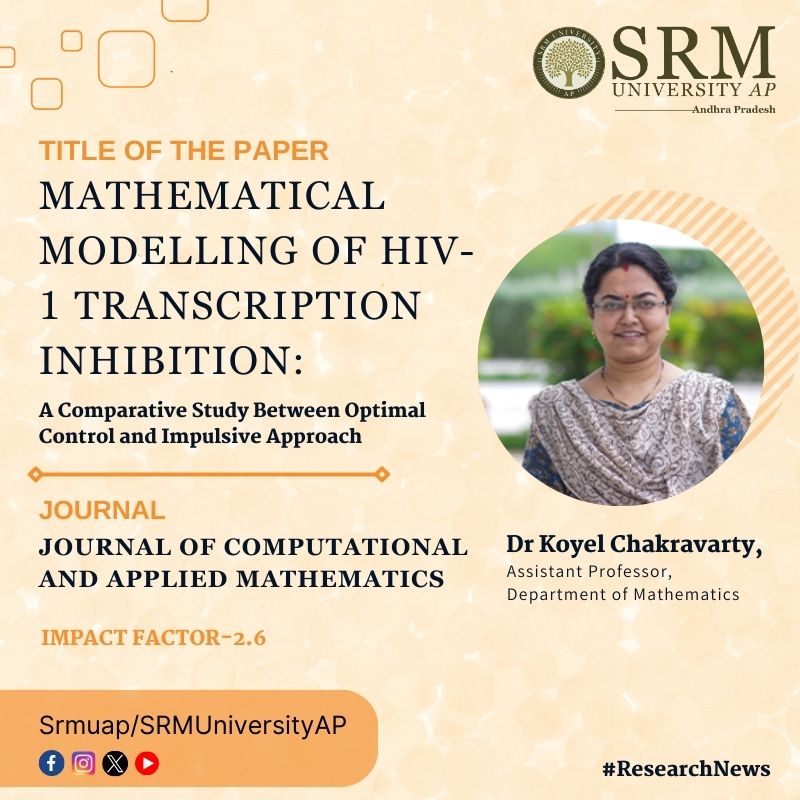
The combat against HIV, the virus responsible for AIDS has witnessed consistent advancements and studies put forward by researchers in various fields. To identify a more intelligent and effective approach to combat HIV-1 and enhance the understanding of the workings of its treatments, Dr Koyel Chakravarty, Assistant Professor, Department of Mathematics has published a paper titled “Mathematical modelling of HIV-1 transcription inhibition: a comparative study between optimal control and impulsive approach” in the Q2 journal, Journal of Computational and Applied Mathematics.
Abstract
By adopting a proactive strategy, this study facilitates the interaction with human immunodeficiency virus type I (HIV-1), successfully navigating its sequential fusion stages. This approach enables efficient infiltration of the virus into a target CD4+T helper cell within the host organism, initiating the virus’s replication cycle. As a retrovirus, HIV-1 orchestrates the conversion of its single-stranded viral RNA genome into a more stable double-stranded DNA structure. The newly formed DNA integrates with the host cell’s genetic material, and the pro-viral DNA transforms into functional messenger RNA (mRNA) with the assistance of the host enzyme RNA polymerase II (Pol II).
The ongoing research focuses on constructing a meticulous mathematical framework using a system of nonlinear differential equations. The investigation aims to assess the impact of a Tat inhibitor on suppressing the transcriptional activity of HIV-1, treating it as an optimal control problem. The study also evaluates the Tat inhibitor’s efficacy as a potential therapeutic intervention for HIV-1 infection. Employing a one-dimensional impulsive differential equation model to determine the mathematically derived maximum concentration of the elongating complex (P2), the research considers the crucial aspect of optimal timing between successive dosages. A comparative analysis contrasts the effects of continuous dosing with impulse dosing of the Tat inhibitor, using numerical analysis to evaluate outcomes. The findings underscore the superior effectiveness of impulsive dosing over continuous dosing in inhibiting HIV-1 transcription. Visual representations of the model’s parameter sensitivities enhance understanding of the intricate physiological and biochemical processes within the system.
Practical implementation/social implications of the research
1. Treatment Optimization:
• Practical Implementation: Develop personalized treatment plans for individuals with HIV-1 based on the optimal control and impulsive approaches identified in the study.
• Social Implication: Improve the effectiveness of HIV-1 treatments, potentially leading to better health outcomes and a higher quality of life for individuals living with the virus.
2. Drug Administration Guidelines:
• Practical Implementation: Provide guidelines for healthcare professionals on the timing and dosage of Tat inhibitors using insights from the comparative study.
• Social Implication: Enhance the efficiency of drug administration, potentially reducing side effects and improving patient adherence to treatment regimens.
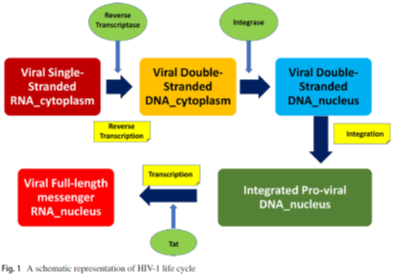
3. Public Health Planning:
• Practical Implementation: Incorporate the study’s findings into public health planning, considering the optimal and impulsive control strategies in broader HIV-1 prevention and treatment programs.
• Social Implication: Contribute to more effective and resource-efficient public health interventions, potentially reducing the overall burden of HIV-1 in communities.
4. Drug Development Strategies:
• Practical Implementation: Inform pharmaceutical companies and researchers about the comparative study results to guide the development of new HIV-1 inhibitors or improvements to existing drugs.
• Social Implication: Accelerate the development of more potent and targeted therapies, offering new options for managing HIV-1 infections.
5. Patient Education:
• Practical Implementation: Develop educational materials for individuals with HIV-1, explaining the importance of adherence to optimized treatment plans based on the study’s findings.
• Social Implication: Empower patients to actively participate in their treatment, potentially leading to better treatment outcomes and reduced transmission rates.
6. Policy Recommendations:
• Practical Implementation: Present policy recommendations to healthcare institutions and government agencies based on the study’s outcomes.
• Social Implication: Influence health policies to integrate the most effective strategies for HIV-1 transcription inhibition, potentially contributing to more efficient resource allocation and improved public health outcomes.
7. Global Health Impact:
• Practical Implementation: Collaborate with international health organizations to disseminate the study’s findings globally.
• Social Implication: Contribute to global efforts in controlling the HIV-1 pandemic, fostering collaboration and knowledge-sharing among nations.
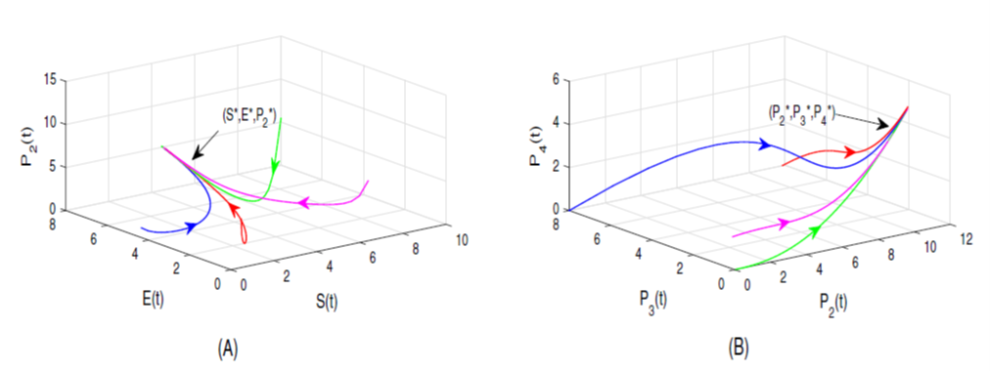
8. Reduced Healthcare Costs:
• Practical Implementation: If the impulsive approach proves more cost-effective, healthcare systems can implement this strategy to potentially reduce the overall cost of HIV-1 treatment
• Social Implication: Alleviate financial burdens on both individuals and healthcare systems, making HIV-1 treatment more accessible
In summary, the practical implementation and social implications of this study extend from optimizing individual treatment plans to influencing global health policies, ultimately contributing to more effective HIV-1 management and improved public health outcomes.
Collaborations
- Prof. D C Dalal, Professor, Department of Mathematics, IIT Guwahati
- Prof. A K Sarkar, Professor, Centre for Mathematical Biology and Ecology, Department of Mathematics, Jadavpur University
- Dr L N Guin, Associate Professor, Department of Mathematics, Visva-Bharati
Future Prospects of the Research
- Mathematical Modelling of Cholesterol Dynamics.
- Mathematical Modelling of Muscle Regeneration.
- Mathematical Modelling of Bone Remodelling
- Mathematical Modelling of Glucose-Insulin Dynamics.
- Mathematical Modelling on HIV-1 Transcription.
- Mathematical Modelling of Population Dynamics for Patients suffering from Diabetes.
- Published in Departmental News, Math News, News, Research News


